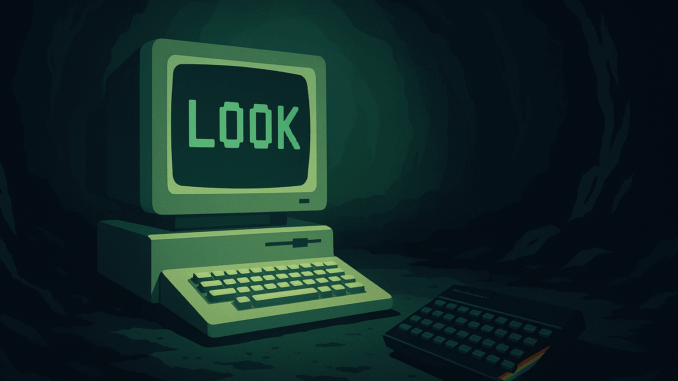
A Night With the Spectrum
There was a moment-usually late at night, headlamp on, tape deck spinning-when the blinking cursor of a ZX Spectrum wasn’t just a line on screen. It was a portal. Type “LOOK” and suddenly you weren’t in your bedroom in Bristol anymore; you were standing in a dimly lit cavern with exits north and west. Text adventures didn’t just let you play a game. They let you be there.
If you ever sat cross-legged on the floor, cassette loading and fingers firmly crossed the tape wouldn’t give up at the worst possible moment, you’ll know what I mean. The thrill of hearing that shrill loading screech still brings me out in goosebumps-and not just because my tape deck was temperamental.
Learning the Language: Parser Literacy
In the early 1980s, before save states and photo-realistic graphics, we had the parser: a blinking, patient command line daring us to say something clever. Games like The Hobbit, Lords of Time, and Colossal Cave Adventure turned home computers into interactive novels where imagination did the heavy lifting. We weren’t just players; we were participants, puzzle-solvers, sometimes even poets (if you ever tried to sweet-talk the parser into recognising your oddly phrased command).
Back then, there was a kind of literacy to gaming. You didn’t just click your way forward-you had to read, interpret, and speak the computer’s language. Some of us even started writing our own adventures, often fuelled by the likes of The Quill (cheers, Gilsoft) or PAW, the Professional Adventure Writer. There’s still a battered cassette somewhere in my attic labelled ‘Petrol Station Ferret’-a masterpiece of haunted filling stations and talking animals, which made precisely no sense but made me feel like an author.
Community: Beyond the Bedroom
The real magic wasn’t just on the screen-it was out in the wild. Swapping hints at school, reading adventure tips in Your Sinclair, or scribbling crude maps on graph paper (usually the back of maths homework-sorry, Mr Topping). There was nothing like the camaraderie: passing adventure solutions round in the playground, or turning up at the local computer club, clutching a tenner for your next game tape from Dixons or Maplin. Half the fun was trying to draw out a map for The Hobbit while your mate tried to convince you that “SAY PLUGH” was the answer to everything.
And the cultural flavour? Pure British. From the dry wit of Bored of the Rings to the gloriously daft logic of games inspired by Monty Python, these adventures dripped with local charm and in-jokes only someone who’d grown up watching Ceefax and swapping tapes on wet weekends would get.
British Humour in 8-Bit Worlds
Our text adventures had a personality all their own: sarcastic narrators, fiendish puns, and game logic that made sense only if you’d spent too long arguing about biscuits at a bus stop. British developers like Level 9 and Magnetic Scrolls were at the forefront, building universes out of nothing but words and a bit of cheek.
A good parser was worth its weight in gold. When the game finally understood your clumsy input, you felt like Alan Turing-until the next puzzle had you stumped for another week.
Legacy and New Frontiers
Of course, games have changed out of all recognition. Today’s titles are vast, beautiful, fully voiced, and animated. But there’s something about that old intimacy that’s harder to find. Voice recognition and AI will happily interpret our words-but not always our meaning. Back then, the parser wasn’t trying to show off; it just wanted you to meet it halfway, and that bargain felt special.
Don’t get me wrong-modern games are jaw-dropping, and it’s hard to argue with the sheer variety on offer. But sometimes, it feels as if we’ve traded a bit of the magic for all that convenience.
Still, the flame hasn’t gone out. Interactive fiction is alive and kicking-just look at IFDB or itch.io for proof. Tools like Inform 7 and Twine mean that anyone, anywhere, can have a go at spinning their own digital yarn. It’s heartening to see a new generation realise that the best graphics chip in the world still can’t beat the one in your head.
Share Your Own Adventure
So, what parser command stumped you for days? Did you ever trade adventure maps at school, or cobble together your own game on a battered old cassette? Drop your stories in the comments-let’s see who can out-nerd the rest of us.
Maybe it’s time to load up Zork again and see if I still remember how to get past that damn troll. Or better yet, maybe it’s time to write something new.

Leave a Reply